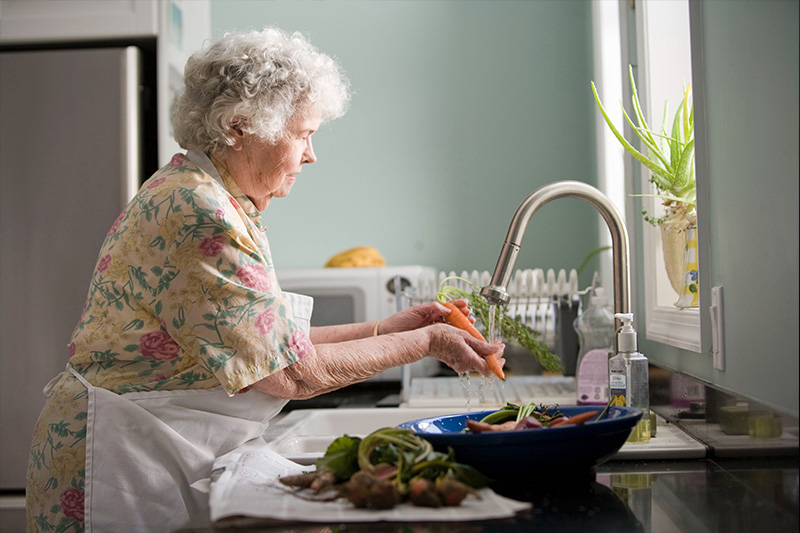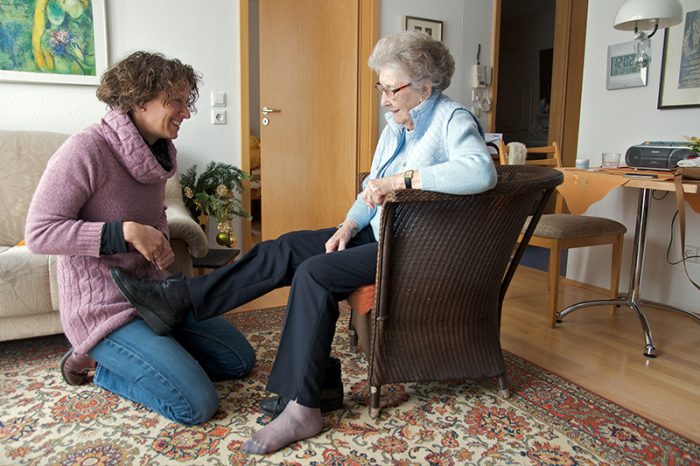If you asked a room full of 40 adults between the ages of 30 and 60, “Hands up if you want to be forced to move out of your home and go live with strangers,” it would be amazing if anyone raised their hand. Almost no one wants this, yet this is exactly the solution adult children might suggest to a parent who needs a bit of help. It’s never put that way, of course—it’s more likely to be part of a conversation about how good the assisted living facility is, how much safer it would be to live here, and how much “help” is needed. It’s a difficult conversation and an even more difficult situation, especially since recent statistics state that 90% of seniors wish to age in their home.
Unfortunately, staying independent at home isn’t always possible. Moving to an assisted living facility can be a good choice for those who wish it, but what about those who don’t? What about those who don’t need quite that much assistance? If you or a loved one are the latter, in-home care might be right for you.
In-home care:
- Allows seniors to stay in their homes and maintain their independence safely.
- Can be combined with home adaptation (small changes to the house to increase safety).
- Can be customized based on the level of help required, from a few hours per week to 24/7 shift care.
- Offers focused one-on-one care from the caregiver (in assisted living, ratios of 1 to 15 are normal).
- Complements individual schedules and lifestyles.
- Helps with the activities of daily living, such as shopping, medicine reminders, food preparation, dressing, laundry, light housework (and pet care), bathing, toileting, transferring, walking and transportation.
 Not everyone knows about in-home care and many people mistakenly believe it to be prohibitively expensive. There was a time when in-home care was the norm, mostly in the form of seniors moving in with their adult children and the entire family; most of whom lived nearby and shared in their care. In today’s faster moving and more geographically diverse society, living with family isn’t always an option, and besides, a lot of seniors don’t want to live full-time with their adult children.
Not everyone knows about in-home care and many people mistakenly believe it to be prohibitively expensive. There was a time when in-home care was the norm, mostly in the form of seniors moving in with their adult children and the entire family; most of whom lived nearby and shared in their care. In today’s faster moving and more geographically diverse society, living with family isn’t always an option, and besides, a lot of seniors don’t want to live full-time with their adult children.
With in-home care, seniors receive professional care from Certified Nursing Assistants or Home Health Aids. These professionals are background-checked, experienced and insured—at least, they should be, which is why it’s vital to obtain in-home care through a reputable agency. When using a licensed agency, the caregivers are employed by the agency, and the agency assumes responsibility and liability if the caregiver should be injured on the job. When it comes to background checks, agencies have access to tools private citizens do not, such as the federal L2 Background Check. Plus, if the primary caregiver becomes ill or otherwise unable to come to work, the agency will send an experienced backup or replacement.
Look for an agency that displays a state license number (e.g. HHA: XXXXXXXXX; Home health agency, nine digits). If the agency only displays HMC: XXXXXX (Homemaker and companion service: six digits), some assistance may not be available, including more “hands-on” care that some seniors require.
Ask for proof of quality, reviews and recommendations. Ask how they hire caregivers. Are the caregivers full-time employees (W2 employees) or contractors? Be aware that if the agency is a nurse registry, they only employ contractors.
In a case like this, “you get what you pay for” is important—when you pay low rates, it almost certainly means the agency pays the caregivers low rates, which doesn’t bode well for loyalty and retention. But be careful of rates that are too high as well, as it may be indicative of national or franchise operation, which can take away from more personalized, individual care.
Arm yourself with the knowledge stated here, and you will have means and reasoning to help yourself or your loved ones maintain independence in the home.

